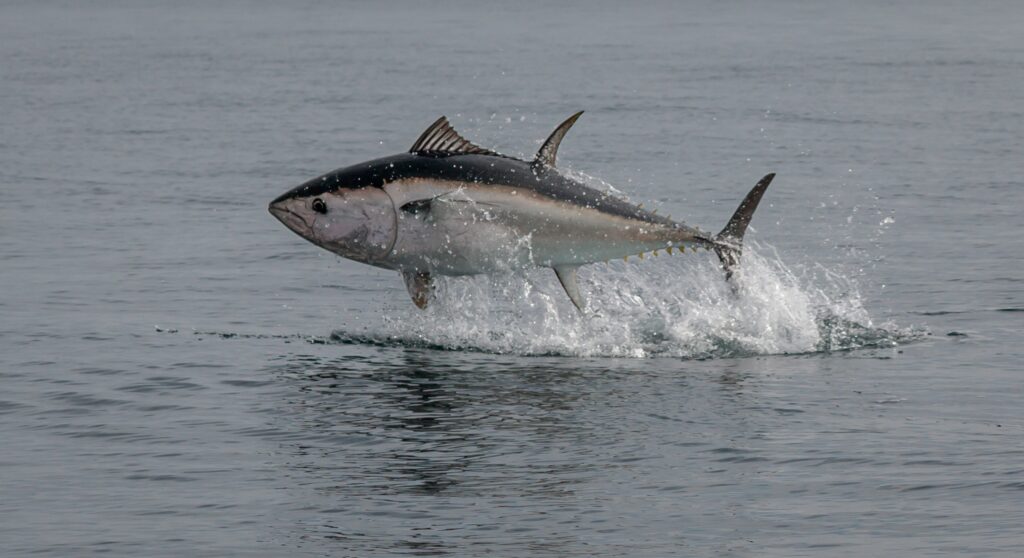
January: the Wilding Gardens conference, the start of a movement
The year begins by plummeting us into a deep freeze – snow and ice lay over the country for a week, shadowed by biting arctic
Home / Bluefin tuna: a talisman for recovery, not a trophy on our plates

Ned Burrell
Published November 2025
Atlantic bluefin are back! Rising numbers of this magnificent tuna have been heralded by many as a conservation victory. Once common in our waters as far as Scarborough and Whitby, bluefin disappeared in the 1960s due to overfishing. Now, thanks partly to international cooperation on fishing quotas, this gigantic fish, that can weigh hundreds of kilograms, can once again be seen off the coast of Cornwall, Devon, the Isles of Scilly and Ireland.
Bluefin hold cultural significance across the world. It is emblematic of sushi and the sole focus of the Spanish tuna festival that has been held annually in the Mediterranean for thousands of years. Ancient Greek texts write about similar festivals where young boys would be stationed on top of the Acropolis in Athens as lookouts for the porpoising tuna making their way from the Black Sea. Cult status and world-wide demand have pushed prices to astonishing heights, with the record set in 2019 for a single 300kg blue fin reaching $1.3 million and is one of the reasons why the species was fished to almost global extinction in the 20th century.

Bluefin are a pelagic, apex predator, hunting in packs across oceans. These giants are thought to live 30-40+ years. At the top of the food chain, they are seen as an indicator of a healthy ecosystem, evidence of the presence of plentiful prey species needed to support them. In 2023, the UK government issued new licences for fishers to line-catch bluefin in our waters, both for sport and the food industry. As a result, British line-caught, or, “local” tuna, can once again be seen on menus in the trendiest restaurants in London.
However, the jury is still out on whether British bluefin are sustainable. We need to consider the considerable threats that this fish still faces. What appears as “local” on Cornish and London menus also appears on French, Spanish, Portuguese, Italian, Greek and Turkish menus as “local”. This is a fish that traverses oceans and is targeted and hunted on every part of its migration. It’s also a hunter that relies on abundance of food, primarily, in our case, mackerel and herring – two species that are, in themselves, on the decline. Throw in melting icecaps and warming ocean currents and you add a whole new layer of extinction threat. Tuna need a healthy, thriving ecosystem with a well-established food chain in order to survive. The Atlantic and Mediterranean – let alone our UK coastal waters – are far from that.
At Knepp, we have seen through our re-introduction of storks how a species rising from the ashes can become talismanic of environmental recovery. Circling in our skies again, the stork has brought attention to other species that we are missing from Britain. Perhaps tuna can do the same. The interest from fishers, sport fishers, chefs, conservationists and local governments offer an almost unique opportunity to unite our efforts to restore and protect our oceans. Tuna should be our talisman, a species to rally around, to champion, to unite, to restore and protect our oceans. We need healthy sea as much as the tuna. But for now, keep tuna off our menus!

The year begins by plummeting us into a deep freeze – snow and ice lay over the country for a week, shadowed by biting arctic

We are looking for an engaging and passionate Shop Manager to join our team and help take the shop in exciting new directions, including possibly

We’re looking for a skilled and detail-focused Pastry / Prep Chef to join Knepp Wilding Kitchen on a permanent basis.
Knepp Wildland Safaris, our gardens and campsite are all about the quiet and patient observation of nature.
Some of the species we are likely to encounter are shy or can be frightened by loud noises or sudden movements. Our campsite with open-air fire-pits, wood-burning stoves and an on-site pond is unsuitable for small children.
For this reason, our safaris, garden visits, holiday cottages and campsite are suitable only for children of 12 and over.
You’ll receive relevant offers and news by email. This will include information about the Rewilding Project, online store products, the Wilding Kitchen Restaurant / Cafe, and other exciting experiences / events across the Knepp Castle Estate. For more information, view our Privacy Policy.